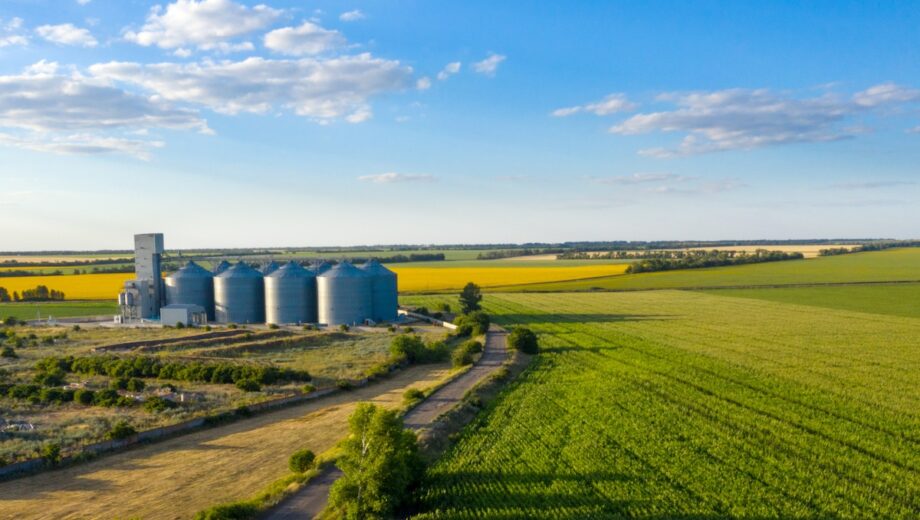
Investing in the future: 2023 Actions, Insights, and Lessons
As agricultural supply chains grapple with climate change, economic pressures, and the demand for sustainability, Midwest Row Crop Collaborative members continue leading with valuable insights for companies and stakeholders seeking to adopt regenerative agriculture practices, policies, and strategies. Our 2023 annual report highlights the Midwest Row Crop Collaborative’s role in testing new ways to engage in sustainable agricultural practices that not only benefit the environment but also enhance long-term economic viability and rural vitality.
Shifting Landscapes in Midwestern Agriculture
In 2023, the agricultural industry in the Midwest continued facing unprecedented challenges. From severe weather patterns, such as prolonged droughts affecting over 80% of corn and soybean crops, to economic pressures like rising input costs, the industry is under strain. These challenges have been further exacerbated by the delayed passage of the Farm Bill, creating uncertainty for both farmers and supply chain partners.
Significant investments are being funneled into climate-smart agriculture. Programs that aim to promote practices like cover cropping, crop rotations, and precision nutrient management, such as the USDA’s Regional Conservation Partnership Program and the Partnership for Climate-Smart Commodities, are now in full-swing. More than $4.6 billion in federal funding has been allocated to drive conservation and climate-smart agriculture in the United States, with much of this investment in the Midwest. Midwest Row Crop Collaborative (MRCC) members are key players in these public-private efforts, contributing their own resources to expedite systems change.
Driving Regenerative Agriculture
The Midwest Row Crop Collaborative’s unique value lies in its collaborative, precompetitive environment focused on fostering learning leading to action. In 2023, MRCC introduced two new systems change initiatives: crop diversification and biofuels learning. MRCC initiatives focus on intensive learning journeys, ways to influence policy, and opportunities to develop projects that foster regenerative agricultural practices.
Corporations, government, NGOs, producers, and implementing partners play crucial roles in creating a successful regenerative agriculture system. With members spanning the entire agricultural value chain, from input suppliers like Bayer to retailers like Walmart, MRCC is working to create supply chains primed to prioritize sustainable practices while maintaining productivity and economic viability.
For organizations working within the agriculture supply chain, the 2023 report provides key insights into strategies to support regenerative practices.
Investing in the Future
One of MRCC’s core principles is de-risking practice adoption for farmers. Cover crops, for example, provide multiple benefits such as improved soil health, increased biodiversity, and reduced greenhouse gas emissions. However, many farmers are reluctant to adopt these practices due to economic risks and the lack of market infrastructure. MRCC is addressing these barriers by working with partners like Practical Farmers of Iowa and members such as Unilever and PepsiCo to provide financial and technical support to farmers. This support helps farmers overcome the initial costs of adopting new practices and ensures long-term sustainability.
By investing in conservation finance solutions, companies are helping de-risk farmer transitions to regenerative agriculture while meeting science-based targets for reducing greenhouse gas emissions. For example, PepsiCo and Nutrien are working with the Soil and Water Outcomes Fund to design and implement tailored programs that support practices including cover cropping and nitrogen reduction.
Another example lies in Midwest Row Crop Collaborative members’ investments in promoting crop diversification as a means of building resilience in agricultural systems. Diversified crop rotations not only improve soil health and biodiversity but also provide economic benefits by spreading risk across multiple crops.
Supporting Policy Advocacy
The upcoming Farm Bill presents a significant opportunity for companies to influence U.S. agricultural policy in ways that support sustainability goals. MRCC members are actively involved in advocating for regenerative agriculture policies. Key recommendations include improving the monitoring and verification of climate-smart practices, streamlining processes for tracking sustainability progress, and increasing investment in conservation programs.
Biofuels Place within Sustainable Agriculture
With 40% of U.S. corn production now being used for biofuels, there is a significant opportunity for farmers to integrate regenerative practices into biofuel feedstocks, including corn and soy. Through our shared learning series, members are seeking to understand which elements comprise best-in-class procurement for biofuels within regenerative agriculture systems. Procurement practices have the power to reduce environmental impact and create new market signals for sustainably produced commodities.
Cultivating Connections and Expanding Engagement
For organizations seeking ways to expand their reach in sustainable agriculture, engaging with producers remains a critical challenge. MRCC members actively work to connect farmers with conservation programs through trusted relationships and innovative engagement strategies. In partnership with Trust In Food™, the Midwest Row Crop Collaborative and Environmental Initiative developed a values-based engagement approach to reach middle-adopter farmers who are interested to know more but are not quite ready to make changes to their practices.
This approach, tested through various outreach methods, has been successful in increasing farmer awareness and readiness to adopt new practices. By providing a mix of educational resources and direct support, organizations can play a pivotal role in scaling the adoption of conservation practices across the Midwest.
Looking Ahead: Opportunities for 2024 and Beyond
MRCC members remain committed to continuing efforts to drive systems change within the U.S. food system. Key priorities for the coming year include applying insights from crop diversification and biofuels initiatives to in-field and supply chain programs, expanding project opportunities through member “sprints,” and recruiting new partners to the collaborative.
For corporations looking to align their supply chains with sustainability goals, the Midwest Row Crop Collaborative offers a trusted network of partners, access to innovative conservation programs, and the opportunity to influence policy outcomes designed to support long-term agricultural resilience. Our members invite you to join us in shaping the future of sustainable agriculture.